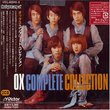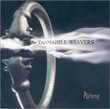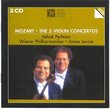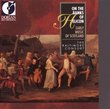| All Artists: Giuseppe Verdi, John Eliot Gardiner, Jean-Philippe LaFont, Hillevi Martinpelto, Orchestre Revolutionnaire et Romantique, Anthony Michaels-Moore, Sara Mingardo, Rebecca Evans, Antonello Palombi Title: Verdi - Falstaff / Lafont, Martinpelto, Michaels-Moore, Mingardo, R. Evans, Palombi, E. James, Gardiner Members Wishing: 0 Total Copies: 0 Label: Philips Release Date: 4/10/2001 Genre: Classical Style: Opera & Classical Vocal Number of Discs: 2 SwapaCD Credits: 2 UPC: 028946260326 |
Search - Giuseppe Verdi, John Eliot Gardiner, Jean-Philippe LaFont :: Verdi - Falstaff / Lafont, Martinpelto, Michaels-Moore, Mingardo, R. Evans, Palombi, E. James, Gardiner
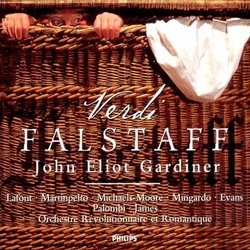 | Giuseppe Verdi, John Eliot Gardiner, Jean-Philippe LaFont Verdi - Falstaff / Lafont, Martinpelto, Michaels-Moore, Mingardo, R. Evans, Palombi, E. James, Gardiner Genre: Classical
The ripe miracle of Verdi's old age, Falstaff is his last opera and many would say his best. It's through-composed, without the numbers and arias that typify the rest of his output; only Falstaff's "honor" monolog makes it... more » |
Larger Image |
CD DetailsSynopsis
Amazon.com The ripe miracle of Verdi's old age, Falstaff is his last opera and many would say his best. It's through-composed, without the numbers and arias that typify the rest of his output; only Falstaff's "honor" monolog makes it into aria collections. This is a connoisseur's opera, but one all can enjoy, full of inventive orchestration, hilarious comedy, and, at its close, heart-warming reconciliation. Two recordings have dominated, Toscanini's classic 1950 version, brilliantly conducted with a good cast, and Karajan's 1956 stereo version with a great orchestra, the Philharmonia, and a great Falstaff in Tito Gobbi. Gardiner's version is to those as a fly is to an elephant. The period instrument band lurches from raw explosiveness to feeble whimpering. The singers range from good to adequate. Lafont's Falstaff might be interesting on stage, but on disc his generalized interpretation and ordinary voice don't compel. Gardiner whips through the score with energy, but also with a cold aggressiveness at odds with the music. The engineers give us opaque sound with the orchestra front and center, blanketing the singers. Set the volume at realistic levels for quiet parts and the loud ones blast you out of the room; set it for the loud parts, and huge chunks of the work vanish from audibility. Toscanini on RCA and Karajan on EMI are still the champs. --Dan Davis Similar CDs
Similarly Requested CDs
|
CD ReviewsBravo! Jonathan J. Casey | the twin cities | 07/20/2001 (5 out of 5 stars) "I've read highly contrasting reviews of this recording, but the consensus seems to be that the cast is not on a par with those in the existing catalog. If you are not a seasoned Verdi-listener, though, you will find that this is an incredibly exciting, entertaining opera...and a well-recorded version of it. I am new to this repertoire, though I did give Bernstein's 1966 recording for CBS a quick listen. I am also a period-instrument freak, and I freely admit that I probably wouldn't have given this last opera of Verdi's any time if Gardiner hadn't recorded it. That said, I am by no means an uncritical listener, and I have to say that I approached this with hesitation but was really surprised and pleased. Lafont may not be an international superstar but he is by no means lacking in skill or personality. The female cast is largely excellent (though occasionally overwhelmed by the orchestra), Bardolfo and Pistol are very spirited, and above all, the instrumental ensemble is superb. There is never a dull moment in Verdi's scoring nor in the performance, for as usual Gardiner leads with dynamic rhythm and verve. I fell in love with this very quickly, which is unusual for someone who tends toward 18th century instrumental music. Gardiner's "Falstaff" would make an excellent introduction to Verdi, to opera, or to the ever-expanding world of historically-informed performance. Thanks to Phillips for releasing this much-needed recording. I hope we'll see more of this kind of exploration soon." Gardiner in a Toscanini mood Mike Birman | Brooklyn, New York USA | 07/16/2004 (4 out of 5 stars) "I have seen some truly negative reviews of this production. Traditionalists become quite apoplectic with even the theoretical juxtaposition of Gardiner and Verdi. But perhaps the choice of Falstaff as his inaugural entry into this portion of the Verdi repertoire is not so strange. Gardiner emphasizes the Mozartean clarity of Verdi's autumnal buffa masterpiece. His use of "historically informed" production values and period instruments reinforces the 18th Century sparkle and his inevitable propulsive tempo gives this production a forward drive that any Indy racer would envy. Sure it's a fleet version. Breathless, in fact. Yet Gardiner manages to keep control of the proceedings so that a sense of drama-and even pathos-is conveyed by a cast that buys into his vision. Inevitably with such an ensemble approach there is an aura of anonymity surrounding this cast. I confess I often lose touch with who's who as the Opera zips by. That is the drawback to this recording. If you were raised on Karajan and his glorious recording of this Opera, with its warmth and astounding individual performances, you may hate Gardiner's comparative alien strangeness. But if it was Toscanini you were exposed to first then this performance will seem oddly familiar. It has a similar approach, if only in mood. I have many recordings of Falstaff in my collection. It is a favorite Opera that, along with Otello, is Verdi's sublime passport to Valhalla (forgive me Maestro). Gardiner's version is certainly not my favorite. He does make it fun to listen to, however. There is a sense of joy that Gardiner conveys. And affection for Verdi and this late miracle. For that, I rate this recording 4 stars, reserving 5 stars for what is unquestionably it's finest recorded performance: Karajan's wondrous 1956 recording with Gobbi, Alva and Schwarzkopf." Damn! It could had been much better Gerardo Cabrera Munoz | México | 06/27/2001 (4 out of 5 stars) "Gardiner had a big success with his very first Verdi recording some years ago, the Requiem and the 4 Sacred Pieces. It was perhaps not wise of him to start the operas with the very last, the greatest and most difficult of all. There are interesting things in his conducting, and his period-instrument orchestra plays superbly, but a great Verdi conductor HAS to conduct the singers as well, especially when they obviously are new to their roles. The bass-baritone Jean-Philippe Lafont sang often with Gardiner when he was in charge of the Lyon Opera. In the French repertoire he is mostly excellent, and his fine, rich instrument could have been ideal for Fastaff, unfortunately his characterisation is only mildly entertaining. Much more fun can and should be had with this great role. Just listen to the great Giuseppe Taddei or Tito Gobbi and you are altogether in a different league of singing-actors. Even worse is the pale Ford. Anthony Michaels-Moore is hardly a Verdi baritone, and he doesn't show much personality either. The women in general are better, especially the outstanding contralto Sara Mingardo as Mrs. Quickly. What a pity that Gardiner didn't use Bryn Terfel as Falstaff and Thomas Hampson as Ford. Of course Terfel is still too young for the title role, but at least his truly first class voice would have been worth collecting. As it is, this prim and proper Falstaff is "interesting" rather than "enjoyable"."
|

 Track Listings (16) - Disc #1
Track Listings (16) - Disc #1